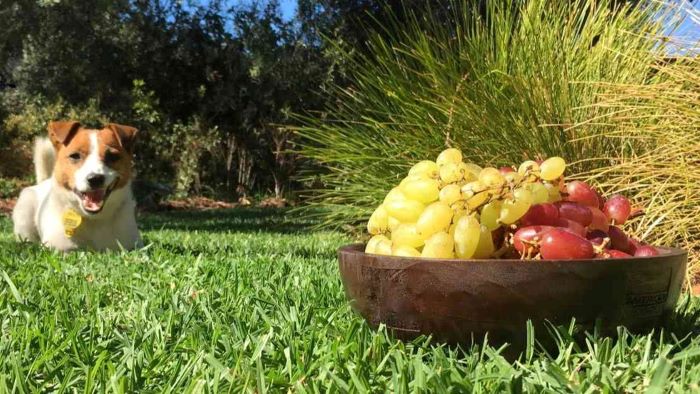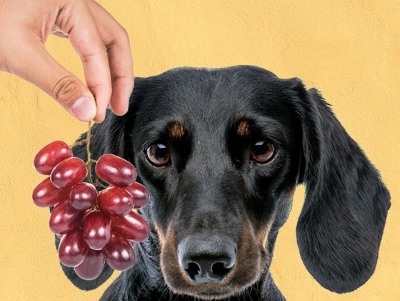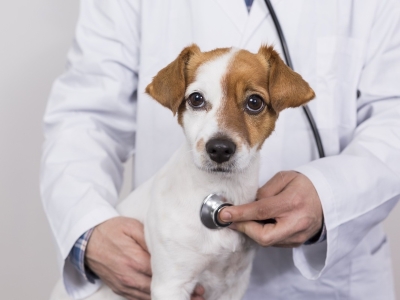In the world of pet care, understanding the dietary needs of our canine companions is vital.
Grapes are a delicious and nutritious snack for humans, but what about our canine companions? Can dogs eat grapes and enjoy the same benefits as we do? Or are grapes harmful to dogs and should be avoided at all costs?

Dogs cannot eat grapes; that much is obvious. Grapes are very poisonous to dogs and can lead to serious health issues or even death, coupled with raisins and currants.
This blog post will cover the dangers of grapes for dogs, how many grapes it takes to kill a dog, the symptoms of grape poisoning in dogs, and what to do if your dog consumes grapes.
Contents
Why Are Grapes Toxic to Dogs?
The precise reason why grapes are poisonous to mutts is still obscure. Researchers have not been able to recognize the particular substance or compound in grapes that causes the antagonistic response in dogs.
In any case, they have found that grape ingestion can harm the kidneys of mutts, leading to intense kidney disappointment[1].
When the kidneys can no longer filter waste items from the blood and stop working effectively, acute renal failure[2], a potentially fatal illness[3], develops.

As a result, toxins may accumulate in the body and harm the heart, brain, and liver, among other organs and systems.
The following are some elements that might affect how severe grape poisoning is in dogs:
The amount and type of grapes ingested:
A few ponders have proposed that seedless grapes may be more poisonous than seeded grapes, and raisins may be more harmful than fresh grapes.
In any case, there’s no secure supply of grapes or raisins for mutts, and indeed, a single grape can be deadly for a few pooches.
The size and weight of the dog:
Littler mutts may be more helpless to grape harmfulness than bigger mutts, as they have less body mass to weaken the poisons.
In any case, bigger dogs can also suffer from grape harm if they eat enough grapes or raisins.
The individual sensitivity of the dog:
A few pooches may be more sensitive to grape harmfulness than others due to hereditary or natural components.
There’s no way to foresee which mutts will respond gravely to grapes or raisins, so it is best to maintain a strategic distance from giving them to any canine.
How Many Grapes Can Kill a Dog?
How many grapes may kill a dog is a question that has no clear solution since various dogs may respond differently to grape consumption.
According to some research, the deadly dose of grapes for dogs is thought to range between 0.3 and 1.2 ounces per pound of body weight. Accordingly, a 10-pound dog might perish from consuming as little as 3 ounces of grapes, or around 10 to 12 grapes.

However, this is merely a rough estimate, and some dogs may consume less than this quantity and perish, while others may consume more.
As a result, it’s crucial to remember never to offer your dog any grapes or raisins, no matter how little or how many.
What Are the Signs of Grape Poisoning in Dogs?
The signs of grape poisoning in dogs may vary depending on the amount and type of grapes ingested, the size and weight of the dog, and the individual sensitivity of the dog.

However, some common symptoms of grape toxicity in dogs include:
- Loss of appetite
- Lethargy
- Vomiting
- Diarrhea
- Abdominal pain
- Dehydration
- Increased thirst
- Increased or decreased urination
- Bad breath
- Oral ulcers
- Tremors
- Seizures
- Coma
Dogs who eat grapes may have symptoms as soon as a few hours later or as long as several days later. Grape poisoning can cause irreparable renal damage and even death if left untreated.
Chief Veterinarian, Supertails Dr. Shantanu Kalambi says, “Any variations in normal kidney functioning are considered kidney/renal disease. This variation can be due to functional or structural abnormalities in one or both kidneys. The severity of the disease depends on the amount of damage to the renal cells“
What Should You Do If Your Dog Eats Grapes?
Act Swiftly: Time Is of the Essence
Discovering that your dog has consumed grapes or raisins can be distressing, but taking immediate action is crucial.
Grape toxicity can have serious and potentially fatal consequences for your furry friend. Follow these steps to ensure your dog’s well-being:
- Stay calm: Though it’s normal to feel anxious, maintaining your composure will enable you to think clearly and act decisively.
- Collect Information: Note down the quantity of grapes or raisins your dog may have ingested, the type of grapes, and when the ingestion occurred. This information will be valuable for your veterinarian.
- Contact Your Veterinarian: Reach out to your veterinarian or an emergency veterinary clinic immediately. Explain the situation, providing the information you collected. They will guide you on the next steps based on your dog’s size, the quantity ingested, and their overall health[4].
- Induce Vomiting: In some cases, your veterinarian might recommend inducing vomiting at home before you can get to the clinic. Follow their instructions carefully, using hydrogen peroxide as directed. Note that inducing vomiting should only be done under professional guidance.

Why Professional Veterinary Care is Essential
Different dogs may respond differently to grape poisoning[5], and how quickly a dog reacts can have a significant impact on the outcome. Here are some reasons why getting veterinarian help is essential:
- Toxicity Varies: The severity of grape toxicity can differ between individual dogs, making an immediate assessment by a veterinarian essential.
- Kidney Damage: Even if your dog appears fine initially, grape toxicity can lead to delayed kidney damage. A veterinarian can monitor and manage potential complications.
- Treatment Options: Veterinarians can administer treatments like activated charcoal to limit absorption, fluids to promote urine production, and blood work to detect early signs of kidney issues[6].
- Preventive Measures: Veterinary experts can give extra care and direction to moderate potential complications, such as kidney disappointment, which can be life–threatening.
How to Prevent Grape Poisoning in Dogs
Avoiding giving dogs any grapes or raisins in the first place is the best strategy to prevent grape poisoning in dogs.
- Keep these fruits out of your dog’s reach by placing them on high shelves or in sealed containers.

- You should inform your family members and visitors of the risks that grapes pose to dogs and politely request that they refrain from giving your dog any grapes or raisins.
- Make sure your dog cannot access any grapevines or grape plants that you have in your garden or yard.
- You must look for any dropped grapes or raisins on the ground and properly dispose of them.
In the event that you need to deliver your puppy a sound and top-notch treat, you’ll be able to select from numerous other natural products and vegetables that are safe for mutts, such as:
- Apples
- Bananas
- Blueberries
- Carrots
- Cucumbers
- Melons
- Oranges
- Pears
- Pineapples
- Strawberries
- Watermelons
Before offering these foods to your dog, you should always wash, peel, and take out any seeds or pits that might be a choking danger.
Additionally, you should provide them in moderation because eating too much of any meal might lead to obesity or digestive problems.
FAQs
Why are grapes harmful to dogs?
Even in little quantities, grapes and raisins contain chemicals that can cause renal damage and other severe health problems in dogs.
Is grape toxicity the same for all dogs?
There is no safe threshold for grape eating, and different dogs react differently to grapes. Any quantity has the potential to be dangerous.
Can a single grape be dangerous to my dog?
Yes, even one grape can be dangerous, so it’s best to err on the side of caution and keep raisins and grapes out of your dog’s diet completely.
Are there any grape varieties that are safe for dogs?
No grape varieties are safe for dogs. The toxicity appears to be consistent across different types of grapes and raisins.
Can my dog safely eat other fruits?
Yes, several fruits may make safe and satisfying treats for dogs, including apples, blueberries, and watermelon. Before adding new items to your pet’s diet, do your homework, though.
Conclusion
As responsible pet owners, it’s our duty to prioritize our dogs’ health and safety. While the grape debate may continue, the evidence is clear: grapes and dogs do not mix.
By educating ourselves about the risks and making informed choices, we can ensure that our beloved canines lead happy, healthy lives filled with safe and delicious treats that are tailored to their unique needs.
Remember, your furry friend’s well-being is in your hands, and being informed is the first step towards a harmonious and healthy human-dog relationship.
Reference:
- Kidney problems in dogs | WebMD.
- Renal failure in dogs: Causes, symptoms & treatment | Western Carolina Regional Animal Hospital & Veterinary Emergency Hospital
- 2 potentially fatal diseases in puppies | South Seattle Veterinary Hospital
- Dog Health Symptoms A to Z. (n.d.) | WebMD
- Grape, raisin, and currant poisoning in dogs | VCA Animal Hospitals. (n.d.). Vca
- Kidney disease in dogs: Signs, symptoms, and treatment | American Kennel Club.

Dania is a dog groomer living in California, who loves styling dogs. She often uses dog accessories to keep them distracted while grooming. She is also a dog parent to a Pomeranian, Duke. It’s because of him she is always on a lookout for the best dog foods, toys, other dog accessories, and ways to keep him equipped, healthy and happy.

